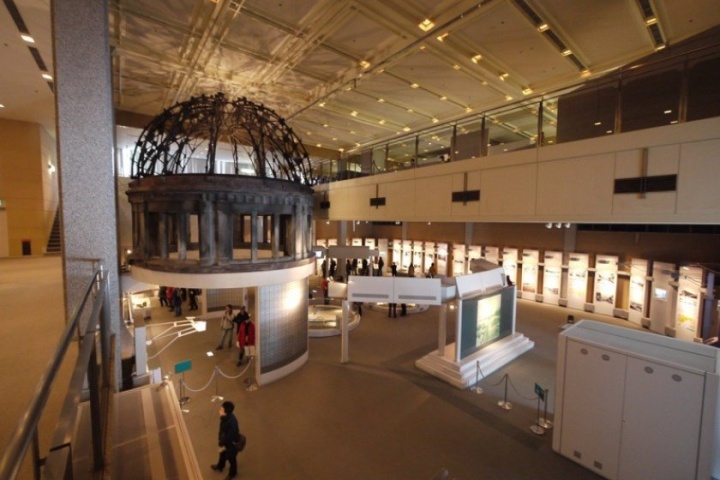Personal from the President
August 6, 2020

On This Day 75 Years Ago…
On August 6, 1945, the first atomic bomb was dropped on Hiroshima, Japan. Three days later, another device was detonated over Nagasaki. More than 200,000 people perished in these fireballs as World War II came to a screeching halt. The choice of how to end the war was between wiping out the civilian population of two large cities versus invading Japan and sustaining possibly a million casualties. The agonizing choice was to kill the civilians. This choice still haunts our consciences.
It was an extraordinarily deadly act that ended World War II. It will be a supernaturally Divine intervention that will save mankind from itself. Jesus Christ describes this in His end-time Olivet Prophecy: "For then there will be great tribulation, such as has not been since the beginning of the world until this time, no, nor ever shall be. And unless those days were shortened, no flesh would be saved; but for the elect's sake those days will be shortened" (Matthew 24:21-22).
Today is a memorial to words of Isaiah: "The way of peace they have not known" (Isaiah 59:8). Jeremiah as well: "They have also healed the hurt of My people slightly, saying, 'Peace, peace!' when there is no peace" (Jeremiah 6:14).
On this day, I would like to share an account of Sajio Ibaraki, who was 16 years old when he witnessed the flash of Hiroshima while fishing in Kochi, about 75 miles away. He conveyed his story to Dr. Yumi Yamamoto, who is a very good friend of Beverly and me. Yumi, too, lives in Kochi on the island of Shikoku. She is an ophthalmologist who studied in British Columbia and is fluent in English. Over the past 20 years, we have worked together on humanitarian projects in Japan and the Philippines (www.lifenets.org/japan). She has visited our brethren in the Philippines and been a guest in our home.
Dr. Yamamoto was Sajio Ibaraki's English tutor and, over time, they became close friends.
Mr. Sajio Ibaraki was born in 1929 in Japan. His first experience of the war was in 1937 when he was eight years old. It was the Second Sino-Japanese War (Battle of Shanghai) that had become a trigger to World War II.
In 1945, Sajio Ibaraki was a first-year high school student in the countryside of Kochi. He was with classmates who had evacuated to Kochi from other areas in Japan to avoid air raids over the big cities of Japan.
Sajio remembered August 6, 1945, as a beautiful and peaceful hot summer day. He enjoyed fishing on the river with his friends. The mountains were green and the sky was bright and clear, but all of a sudden, he saw a flash of light in the sky! Later, he understood that this was the moment the atomic bomb had been dropped in Hiroshima. After three days, on August 9, another bomb was dropped on Nagasaki, causing unspeakable devastation.
In 1948, after graduation from high school, Saijo moved to Hiroshima. There he met many people who experienced the war and the atomic bomb. Today, most of those people are no longer living.
Sajio recalled one friend who is now more than 90 years old. She sustained excessive burns from the sudden explosion, but fortunately survived. However, as her skin healed, dreadful keloids formed, leaving her body scarred.
This scarring was not uncommon. Mr. Ibaraki knew another lady who was the wife of his boss at the bank. He remembered her to be a very beautiful lady who always wore elegant kimonos. First he did not know why, but later he heard she also had horrible keloids on her legs and could not wear skirts.
The population of Hiroshima was 350,000 before the atomic bomb. Within a few months after the bomb was dropped, over 166,000 people were killed either directly from the explosion or from radiation exposure. Later, more and more people died because of radiation damage.
Sajio says he is distressed and frightened by the fact that there are still some people in the world who debate about the right or wrong of using nuclear weapons. Having lived through it, he categorically states that men should not use these weapons ever—without any question. This should be the message and lesson from Hiroshima and Nagasaki. Sadly, though, nine nations have stockpiled about 14,000 warheads, many of them ready for immediate use.
Because it has been 75 years since the atomic bomb, most people who experienced the war have already died and fewer people really know how dreadful, how meaningless and how stupid war is. Mr. Ibaraki stated that after the war, whether you might win or lose, in the long run all you feel is a pity and a regret for yourself and others. There is no real winner in any war.
The Hiroshima Peace Memorial Park is a place almost all Japanese have visited, as well as travelers from all over the world who come and reflect on what happened.
Real peace, though, will come not from words or platitudes, but from a changed heart that only God can give through His Holy Spirit. And that day is prophesied to come!
"I will give you a new heart and put a new spirit within you; I will take the heart of stone out of your flesh and give you a heart of flesh. I will put My Spirit within you and cause you to walk in My statutes, and you will keep My judgments and do them" (Ezekiel 36:26-27).
Then finally the world will be able to fulfill these words: "They shall beat their swords into plowshares, and their spears into pruning hooks. Nation shall not lift up sword against nation, neither shall they learn war anymore" (Isaiah 2:4).

